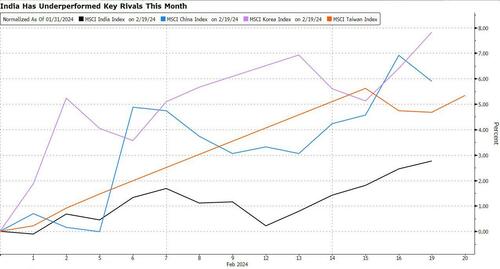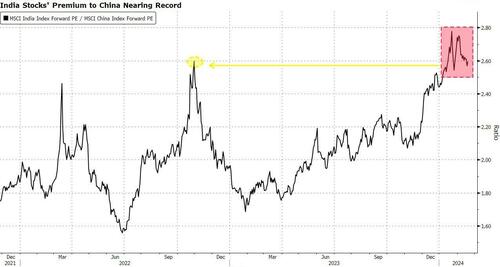
In its latest US Equities Weekly Rundown note, Goldman Sachs wrote that In international markets, the desk continues to field demand for India as investors move capital out of China ETFs; the result is that INDA (iShares MSCI India ETF) has seen consistent inflows this past year, while MCHI (iShares MSCI China ETF) redemptions persist.
And yet, the stellar rally in Indian equities that’s made them an investor favorite has run into headwinds that go beyond elevated valuations, according to Bloomberg market live reporters Abhishek Vishnoi and John Cheng. The commentators note that earnings misses, the attractiveness of rival markets amid expectations of a dovish policy shift by the Federal Reserve and a nascent recovery in Chinese equities "are casting doubts over India extending a rally that saw the nation’s main gauges posting a record eighth-straight year of gains in 2023."
Recently, Citigroup and Societe Generale SA have downgraded India, while foreigners have sold a net $3.8 billion of local shares so far this year, the highest in emerging Asia outside of China. Multi-asset investors are favoring rupee bonds over the South Asian nation’s equities, and some even refute Goldman's observations, saying that the money flows out of China may be slowing as the country steps up its market rescue efforts.
“India is the best longer-term story, but we are taking a bit of profit” due to high valuations, said Sean Taylor, chief investment officer at Matthews Asia. “I will be trimming more of India into Fed cuts on a relative basis because I need to put more capital into places like Korea and Taiwan.”
Despite the short-term profit-taking, the longer-term outlook for India remains intact thanks to the nation’s fast economic growth, an expanding middle class and rising manufacturing prowess.
“Even though there’s a valuation concern, India is in a sweet spot,” said Joohee An, chief investment officer at Mirae Asset Global Investments Co. in Hong Kong. “We’re looking at India with a longer-term approach than other emerging markets.”
Still, a slew of earnings misses in the latest earnings season on top of already stretched valuations, weak consumer demand in some pockets of the $3.4 trillion economy and a still-hawkish central bank have put some investors on the back foot for now.
Indian stocks remain near their most expensive levels ever against battered Chinese peers, just when Xi Jinping’s administration is unveiling measures to prop up the market and boost confidence. That may prompt some investors to rethink their asset allocations across the region.
The S&P BSE Sensex Index is valued at 20 times 12-month forward consensus earnings estimates, higher than its 10-year mean and the most expensive in Asia. China’s mainland benchmark CSI 300 Index, which hit a five-year low earlier this month, trades at little over 10 times future earnings.
“We’ve been underweighting the country because we’re value investors and we struggle in this market,” said Vicki Chi, a Hong Kong-based portfolio manager at Robeco. “We like dirt cheap, but there’s hardly anything in India.”
In its latest US Equities Weekly Rundown note, Goldman Sachs wrote that In international markets, the desk continues to field demand for India as investors move capital out of China ETFs; the result is that INDA (iShares MSCI India ETF) has seen consistent inflows this past year, while MCHI (iShares MSCI China ETF) redemptions persist.
And yet, the stellar rally in Indian equities that’s made them an investor favorite has run into headwinds that go beyond elevated valuations, according to Bloomberg market live reporters Abhishek Vishnoi and John Cheng. The commentators note that earnings misses, the attractiveness of rival markets amid expectations of a dovish policy shift by the Federal Reserve and a nascent recovery in Chinese equities “are casting doubts over India extending a rally that saw the nation’s main gauges posting a record eighth-straight year of gains in 2023.”
Recently, Citigroup and Societe Generale SA have downgraded India, while foreigners have sold a net $3.8 billion of local shares so far this year, the highest in emerging Asia outside of China. Multi-asset investors are favoring rupee bonds over the South Asian nation’s equities, and some even refute Goldman’s observations, saying that the money flows out of China may be slowing as the country steps up its market rescue efforts.
“India is the best longer-term story, but we are taking a bit of profit” due to high valuations, said Sean Taylor, chief investment officer at Matthews Asia. “I will be trimming more of India into Fed cuts on a relative basis because I need to put more capital into places like Korea and Taiwan.”
Despite the short-term profit-taking, the longer-term outlook for India remains intact thanks to the nation’s fast economic growth, an expanding middle class and rising manufacturing prowess.
“Even though there’s a valuation concern, India is in a sweet spot,” said Joohee An, chief investment officer at Mirae Asset Global Investments Co. in Hong Kong. “We’re looking at India with a longer-term approach than other emerging markets.”
Still, a slew of earnings misses in the latest earnings season on top of already stretched valuations, weak consumer demand in some pockets of the $3.4 trillion economy and a still-hawkish central bank have put some investors on the back foot for now.
Indian stocks remain near their most expensive levels ever against battered Chinese peers, just when Xi Jinping’s administration is unveiling measures to prop up the market and boost confidence. That may prompt some investors to rethink their asset allocations across the region.
The S&P BSE Sensex Index is valued at 20 times 12-month forward consensus earnings estimates, higher than its 10-year mean and the most expensive in Asia. China’s mainland benchmark CSI 300 Index, which hit a five-year low earlier this month, trades at little over 10 times future earnings.
“We’ve been underweighting the country because we’re value investors and we struggle in this market,” said Vicki Chi, a Hong Kong-based portfolio manager at Robeco. “We like dirt cheap, but there’s hardly anything in India.”
Loading…







